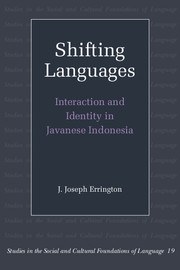Book contents
- Frontmatter
- Contents
- List of figures, maps, and tables
- Acknowledgements
- Preface: suggestions for use
- Note on orthography and transcription
- Map 1 The Indonesian archipelago
- Map 2 Eastern Central Java
- 1 Introduction
- 2 A city, two hamlets, and the state
- 3 Speech styles, hierarchy, and community
- 4 National development, national language
- 5 Public language and authority
- 6 Interactional and referential identities
- 7 Language contact and language salad
- 8 Speech modeling
- 9 Shifting styles and modeling thought
- 10 Javanese–Indonesian code switching
- 11 Shifting perspectives
- Notes
- Works cited
- Index of javanese and indonesian words
- General index
- Titles in the series
2 - A city, two hamlets, and the state
Published online by Cambridge University Press: 01 June 2011
- Frontmatter
- Contents
- List of figures, maps, and tables
- Acknowledgements
- Preface: suggestions for use
- Note on orthography and transcription
- Map 1 The Indonesian archipelago
- Map 2 Eastern Central Java
- 1 Introduction
- 2 A city, two hamlets, and the state
- 3 Speech styles, hierarchy, and community
- 4 National development, national language
- 5 Public language and authority
- 6 Interactional and referential identities
- 7 Language contact and language salad
- 8 Speech modeling
- 9 Shifting styles and modeling thought
- 10 Javanese–Indonesian code switching
- 11 Shifting perspectives
- Notes
- Works cited
- Index of javanese and indonesian words
- General index
- Titles in the series
Summary
As lowland New Order authority and language have entered upland Javanese territory, villagers' senses of community have been shaped by their dealings with the nation-state's saturating presence. Antecedent understandings of community and relations between communities are shifting under social pressures for change which are linguistically mediated by Javanese and Indonesian alike. So too village images of Surakarta, which have long been politically salient on this landscape, are shifting with that city's new relevances for those living at its peripheries. Village ambivalence about the city and city-based institutions were striking to me partly because I was a semi-regular traveler between city and village. But I believe that villagers' shifting perceptions of the city were very much bound up with changing understandings of the territorial authority located there, and of the languages which subserve it.
A convenient way to broach language-related modes of territoriality and village-city relations is the bit of conversation between Javanese villagers-old and young, bilingual and monolingual-set out below as text 2.1. I is Pak Iman, a sixtyish upland villager who remembers the halcyon days of the last “real” king (ratu) of Surakarta (Pakubuwana X, 1893–1939). He refers to the city by its less formal, commoner name, Solo, which I also use in the following discussion.
- Type
- Chapter
- Information
- Shifting Languages , pp. 16 - 34Publisher: Cambridge University PressPrint publication year: 1998
- 1
- Cited by



